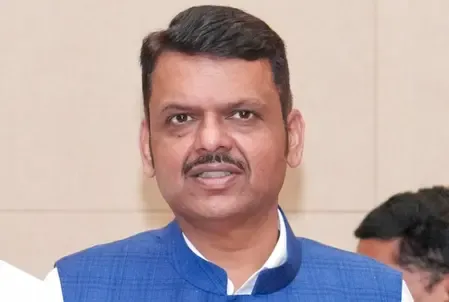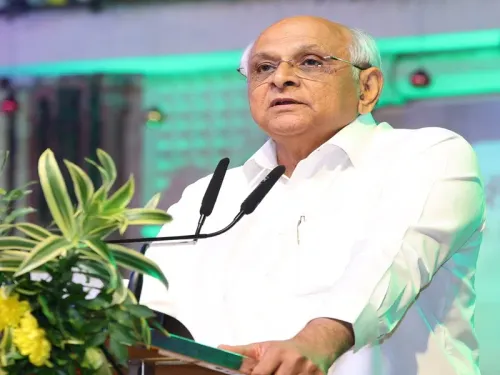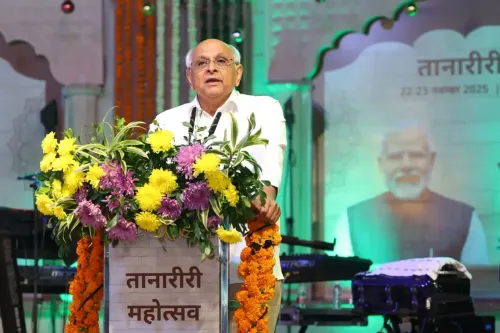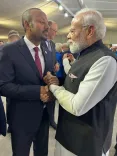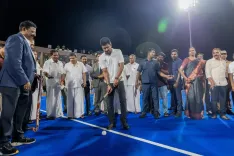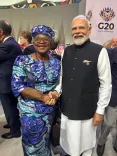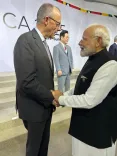Did India's military response to the Pahalgam attack revive global focus on terrorism?
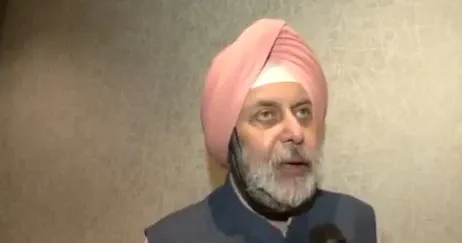
Synopsis
Key Takeaways
- Operation Sindoor was a targeted military operation against Pakistan-based terror sites.
- Global unity against terrorism was emphasized during the conference.
- India's response aims to deter future attacks from Pakistan.
- The economic impact of terrorism on India's tourism sector was discussed.
- Panel discussions are valuable for enhancing public awareness of military operations.
New Delhi, July 24 (NationPress) Nearly three months have elapsed since the tragic Pahalgam terror attack on April 22. Former Indian Ambassador Manjeev Singh Puri stated that India's military operation known as 'Operation Sindoor' aimed only to eliminate terror launchpads and facilities based in Pakistan. This action successfully refocused global attention on the need for a unified condemnation of terrorism in all its manifestations.
Puri made these remarks at a conference held at the Constitution Club in the national capital, organized by The Centre for Global India Insights, a think tank dedicated to international affairs, and India and the World magazine. The event featured in-depth analyses of Operation Sindoor, which was initiated by Indian armed forces to retaliate against the murder of 26 innocent civilians in Pahalgam, Jammu and Kashmir by the Pakistan-based terrorist group known as The Resistance Front (TRF).
Attended by a variety of former defense analysts, diplomats, political figures, media representatives, and notable personalities, the conference examined Operation Sindoor as a significant military response, establishing a new paradigm set by the Modi government that future terror attacks from Pakistan will not be tolerated.
Reflecting on the three months since the Pahalgam attack, Puri remarked, "Pakistan is a central hub for terrorism, and this is widely recognized. Yet, for various reasons, global focus on terrorism has recently waned. We must remind the world that this attention must not diminish; it should remain steadfast on terrorism... Just as Osama Bin Laden was captured in Pakistan a decade ago. Global terrorism, border terrorism, and cross-border terrorism are critical issues that require worldwide focus. Pakistan relies on international support, and it must recognize that there are consequences for terrorism emanating from its territory, which ultimately impacts its own citizens. India and Pakistan gained independence simultaneously, yet today, India stands as the fourth-largest economy globally with a high GDP per capita, while Pakistan must urgently abandon terrorism for its own sake."
Lieutenant General (Retd) Syed Ata Hasnain commented on the three months since the Pahalgam attack, stating, "Operation Sindoor was an 88-hour battle that engaged the entire nation. In modern warfare, it is not just the military that fights; every sector contributes, whether economically, technologically, or through public participation. Analyzing such a complex military operation as Operation Sindoor cannot be done in a mere three months; even less than 20% has been examined so far. Hosting discussions and seminars increases public awareness of India's military responses like Operation Sindoor and positions India as a formidable nation in its fight against terrorism."
According to Manish Chand, Founder and CEO of the Centre for Global India Insights, "There are still numerous questions. This is a major topic in Parliament as it pertains to national security and the country's development. The aim of this conference was to shed light on Operation Sindoor—its ideological and psychological implications. The Pahalgam terror attack was also a form of economic warfare targeting the Indian economy, especially the tourism-dependent economy of Jammu and Kashmir. It served as a geopolitical strategy to hinder India's rise while Pakistan has stagnated."
BJP Member of Parliament Brij Lal stated, "As part of the Modi government's global outreach to expose Pakistan's terrorism, seven all-party delegations visited 33 countries. I participated in one delegation visiting Japan, South Korea, Singapore, Malaysia, and Indonesia. It was crucial that these delegations represented diverse political parties. We conveyed that despite differing views on various issues, all parties united against terrorism, especially concerning national security. In previous terror incidents like Uri and Pathankot, the Modi government executed surgical strikes. Following the Pulwama attack, we launched the Balakot airstrike, and now Operation Sindoor was executed to respond to the Pahalgam attack.
Biju Janata Dal leader Amar Patnaik remarked, "The details of Operation Sindoor will be thoroughly discussed in Parliament and later in the Standing Committee. India's response strengthens the nation and sends a strong message to the global community. It not only communicates to Pakistan but also demonstrates to the world that India is powerful and resolutely opposes terrorism."


